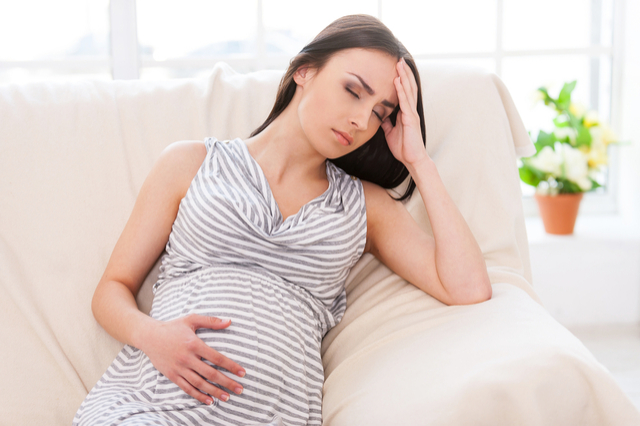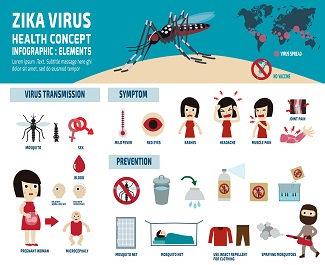Every woman is different, and you might experience pregnancy symptoms that are different from your friend’s. Your symptoms of pregnancy may also differ for each pregnancy that you have.
During this life-changing (literally!) period of your life, your body is going through hormonal changes to adapt to and support the baby that is growing in your body. You are bound to experience at least one (or a few) of the following pregnancy symptoms. But don’t fret, because there are ways that you can learn to deal with these symptoms and to make your pregnancy journey a more manageable and enjoyable one.
Cramping/Spotting
A few days after the egg is fertilised, the egg implants itself in the wall of the uterus. This can cause spotting or implantation bleeding. The spotting may or may not be associated with the cramps. Cramps experienced will be similar to menstrual cramps and many women may mistake it as the start of their period.
You may also experience cramping at different stages of your pregnancy. Cramps during pregnancy are commonly caused by the following reasons and should not be a cause for concern unless the cramps are severe, prolonged or accompanied by other symptoms.
- Implantation Cramping
- Growing uterus
- Constipation
- Gas and bloating
- Sexual intercourse
Cramps during pregnancy, however, may signal that there are medical problems that need to be addressed. They may be caused by a miscarriage, ectopic pregnancy, preeclampsia, placental abruption or preterm labour.
You should consult a doctor immediately in the following cases:
- Your cramp is persistent and does not go away.
- Your cramp is intensely painful.
- Your cramp is accompanied by spotting or bleeding
- Your cramp is accompanied by a change in vaginal discharge; it increases in amount or becomes thicker in consistency.
- You are not yet 37 weeks but are experiencing contractions at least 6 times within an hour. This may be a sign of preterm labour.
- You have blurred vision, fatigue, headache, dizziness, bleeding or feel very unwell.
Vaginal Discharge
During pregnancy, you may notice an increase in vaginal discharge. This vaginal discharge is called leukorrhea. This vaginal discharge is a result of increased levels of estrogen in your body and more blood flowing around your vagina.
Vaginal discharge during pregnancy is typically thin, clear or milky-white, and mild-smelling. You may wear a panty liner if you feel uncomfortable. Avoid wearing tampons during pregnancy as it may cause an infection.
You should consult your doctor immediately in the following situations:
- Your vaginal discharge comes with pain, cramps, or spotting.
- Vaginal discharge has a strong or unpleasant smell
- Vulva is inflamed, red or itchy.
- Vaginal discharge turns a different colour or changes in smell or consistency.
- There is a lot of thin, clear discharge. This may be a sign of a ruptured amniotic sac and requires urgent medical attention.
Morning Sickness
Feeling nauseous or vomiting is a notorious sign of pregnancy. While it is called morning sickness, it can happen at any time of the day. Morning sickness occurs due to the hormonal changes in the body.
Morning sickness can be tiring and exhausting for pregnant women. To prevent morning sickness, eat small meals throughout the day rather than big meals, avoid spicy and oily food, stay hydrated and sleep more. Ginger water has also been found to relieve morning sickness. You can make ginger tea by grating and boiling ginger in water. Lemon also a refreshing fruit that helps to prevent vomiting. You can cut some slices of lemon and put it in your water to drink.
Fatigue/Tiredness
Feeling tired is one of the most common symptoms of pregnancy and it may last throughout pregnancy. Feeling tired during pregnancy is caused by high levels of progesterone in the body. During pregnancy, the body increases production of progesterone, which induces sleepiness.
If you have a poor appetite or are having problems sleeping, you may also feel tired.
To help boost your energy levels, eat a well-balanced and nutritious diet. You should also rest as much as you can and exercise regularly. Avoid high-intensity exercises (e.g. running, boxing) when you are pregnant. Instead, opt for low-impact exercises such as walking, swimming or pregnancy yoga. Exercising releases adrenaline and endorphins (feel-good hormones), which can help you feel more positive and energized. Read more about the benefits of walking for pregnancy and labour.
Headache
Some women might experience headaches during pregnancy. This might be caused by hormonal changes in your body, lack of sleep or general fatigue, dehydration or stress.
The best way to combat a headache is to have sufficient sleep (around 8 hours a day) and to drink a lot of water. You can also find ways to relieve your stress, whether is it baking, watching a funny show, or exercising. Massaging is also a great way to relieve tension and to prevent tension headaches. You can go for massages regularly, or get your partner to massage your neck, shoulders and back.
Food cravings or change in tastes
Food cravings are very normal during pregnancy. While the exact cause of food cravings are not known, they may be due to hormonal changes during pregnancy. You might have some foods that you loved before pregnancy, but hate now. For some women, they may crave for certain foods such as sour food when they are pregnant.
While food cravings are normal, do remember to eat all things in moderation and to have a well-balanced diet in order to nourish your baby. Learn more about nutrition during pregnancy.
Tender, swollen breasts
During pregnancy, estrogen and progesterone levels in your body soar, and that makes your breasts feel tender, swollen and slightly sore. This usually starts around 4 weeks of pregnancy and lasts throughout your first trimester. Your breasts may also experience other changes in preparation for breastfeeding.
Your nipples may protrude more and feel tender to the touch.
Your areolas (dark area around the nipple) become darker and bigger.
You may notice more veins below the skin’s surface.
To ease the soreness, you should wear a comfortable, soft bra with good support. Avoid underwire as that can make you more uncomfortable.
Frequent urination
As your uterus expands to accommodate your growing baby, it exerts pressure on the bladder. As a result, expectant mothers tend to urinate more often. Another cause of frequent urination is the increase in blood supply. During pregnancy, the body produces up to 50% more blood than it did before pregnancy. Therefore, excess fluid gets processed in the liver and is excreted through urination.
Frequent urination is usually not common in the early stages of pregnancy as the baby is still relatively small. It usually happens at about six weeks after conception.
To reduce your urges to urinate, do not take excess fluids before bed. Limit your fluid intake to the daytime. However, do not reduce your water intake just to avoid urination. Staying well-hydrated is important for you and your body.
You can also wear a panty liner in cases where you cough or sneeze, which may sometimes cause urine leakage. Avoid diuretics such as coffee, tea or alcohol. Diuretics will increase the production of urine and thus make you urinate even more.
Constipation
Due to the rise in levels of progesterone in your body, your digestive system can slow down, causing constipation. To relieve constipation during pregnancy, drink plenty of water and eat more foods that are rich in dietary fibre. Foods high in fibre include vegetables, fruits, grains, nuts, seeds and legumes.
Mood Swings
You swing from elation to devastation within a minute, and you wonder why. Once again, hormonal changes in the body can lead to mood fluctuations. Coupled with other pregnancy symptoms such as fatigue, cramps or a lower back ache, it can feel impossible to stay positive. But chin up, mummies!
Do more of the things that make you happy, be it baking, sewing, singing or dancing. Try to stay relaxed and happy, because after all a happy mum makes for a happy baby (it’s true!), and we’re sure that’s what you want for your child.
Dizziness or feeling faint
During pregnancy, your body produces more progesterone which causes your blood vessels to dilate. While this helps to increase blood flow to your baby, it slows the return of the blood to you. As a result, your blood pressure is lowered and the reduced blood to your brain may cause you to feel dizzy.
In addition, your growing uterus also exerts pressure on the blood vessels, which slows down the flow of the blood to the brain.
To prevent dizziness:
· Avoid standing for too long and keep your legs moving to improve circulation of blood.
· Get up slowly when getting up from sitting or lying down
· Have regular meals
· Place a pillow under your upper body to elevate you when you are lying down. This will help to ease the pressure of your uterus on your blood vessels.
Swollen feet
Swelling or edema is very common during pregnancy and it normally occurs in the feet and ankle. It affects about 80% of pregnant women, starting at around week 20 of pregnancy. This happens as the body retains excess fluid to soften the body. This helps the body to expand as the baby develops.
To ease swelling during pregnancy:
- Avoid standing for long periods
- Sit with your feet slightly elevated
- Wear comfortable shoes
- Drink more water as this helps to reduce water retention
- Reduce salt intake
Heartburn
Many women experience heartburn during pregnancy. This is because the placenta produces progesterone which loosens the muscle that separates the esophagus from the stomach. Thus, when this muscle relaxes, the acids in the stomach seep backwards into the esophagus and irritate the sensitive esophageal lining, causing the heartburn.
Furthermore, as the pregnancy progresses, the uterus enlarges, pushing the stomach up against the diaphragm. This squeezes the stomach contents and moves them up the esophagus. This can lead to acid reflux.
To prevent heartburn:
- Eat small meals frequently
- Avoid oily or spicy food
- Do not lie down immediately after eating
- Sleep slightly elevated by propping some pillows behind your back. This can help to prevent acid reflux or heartburn at night.
- Avoid eating citrus fruits such as oranges and grapefruit. Citrus fruits increase acid production in the stomach and may cause heartburn.
If you have problems coping with these symptoms, or experience severe forms of these symptoms, consult your doctor immediately.
Subscribe to receive newsletter on pregnancy and parenting in Singapore.


